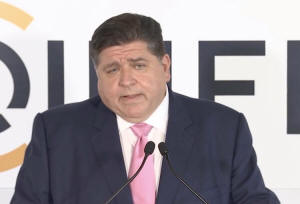With Pritzker's vaccine mandate, new focus on Illinois 'Right of
Conscience' act
 Send a link to a friend
Send a link to a friend
 [September 28, 2021]
By Greg Bishop [September 28, 2021]
By Greg Bishop
(The Center Square) – An Illinois state law
enacted in 1998 could come into focus next month during fall veto
session as Gov. J.B. Pritzker’s COVID-19 vaccine or testing mandate
continues to impact various sectors.
Some are worried lawmakers may attempt to take people’s rights away to
better enforce the governor’s mandate.
Pritzker issued the COVID-19 vaccine mandate in August for workers in
the health care sector, all educators from pre-K through college and
college students. He then delayed it by two weeks. Monday marked the
first day that teachers across the state were to either prove they got
vaccinated or submit to weekly COVID-19 testing.
In Springfield District 186, teacher Kadence Koen says she was put on
unpaid leave for not submitting to weekly tests. She claims the 1998
state law, the Health Care Right of Conscience Act, gives her protection
from submitting to things she objects to.

“I’m a single mom, I have two kids in college right now, so it plays out
right now, it’s kind of a scary situation,” Koen told WMAY. “It’s not a
decision I came to lightly, but I feel like as a mom and a teacher it is
on my shoulders to teach the kids how to stand up for what they believe
in whether it’s my kids or somebody else's kids.”
She’s evaluating what her options are, including potential litigation.
“The benefits of this great country is our forefathers have set up a
system to handle situations like this,” Koen said. “And within the
confines of the law, I will be pursuing that.”
The HCRCA, enacted in 1998, gives individuals the right to not be
discriminated against in their public or private sector job for refusing
a medical procedure for which they have a conscientious objection.
“It shall be unlawful for any public or private employer ... to impose
any burdens in terms or conditions of employment on, or to otherwise
discriminate against … on account of the applicant's refusal to receive,
obtain, accept, perform, counsel, suggest, recommend, refer, assist or
participate in any way in any forms of health care services contrary to
his or her conscience,” part of the HCRCA states.
At Jacksonville public schools, school Superintendent Steve Ptacek
published a letter they sent the governor and Illinois State Board of
Education saying that the district won’t be excluding staff without more
clarity. Ptacek outlined the dilemma: “If we exclude staff that are not
complying with Executive Order 2021-20, we assume substantial legal
risk, but if we do not exclude employees, we are in defiance of an
executive order.”
Defying the governor’s orders could lead to the Illinois State Board of
Education putting the district on probation, and possibly impacting
state funding to the district.
[to top of second column]
|

Gov. J.B. Pritzker speaks at an event in Chicago on Tuesday, Aug.
24, 2021.
Courtesy of Facebook

Ptacek’s letter said it can’t risk taxpayer resources on lengthy
lawsuits challenging the governor’s mandate under the HCRCA that could
come with tens of thousands in legal liabilities.
“For a $50,000/year employee, the penalties and costs could very
realistically cost the taxpayers $500,000 per incident,” he said of
potential legal liability if someone wins a case under the HCRCA.
Illinois Fraternal Order of Police President Chris Southwood said he’s
aware of conversations about changing the HCRCA.
“There have been some discussions with the governor's office as far as
making changes to the Health Care Right of Conscience Act, I can assure
there absolutely have been discussions regarding that,” Southwood said.
He worries state lawmakers could come back next month to reduce
individuals’ rights under the law.
“If they’re going to make these changes, they’re going to be taking away
the rights of our membership to refuse the mandate and the testing,
which is discriminatory in nature,” Southwood said.
Southwood said they’re not anti-vaccine, they’re anti-forced vaccine.
And, for law enforcement, he said there could be resignations over the
mandate, and no one benefits from fewer police on the streets.
“Hopefully it won’t happen, hopefully this law will stand up and it will
prevent our members from being forced to get the vaccine or the
testing,” Southwood said.
Southwood said the FOP will be actively opposing changes to what he said
is the strongest protections for peoples’ rights, and the union will
hold lawmakers accountable.

“We want General Assembly members to know that if you vote for changes
in [the HCRCA] we’re going to make sure that your constituents are aware
that you’re voting to support these mandated vaccines or the testing,”
Southwood said.
Lawmakers return for veto session next month. The Senate President’s
office and the House Speaker’s office didn’t immediately return messages
seeking comment about whether revising the HCRCA will come up during
veto session. |